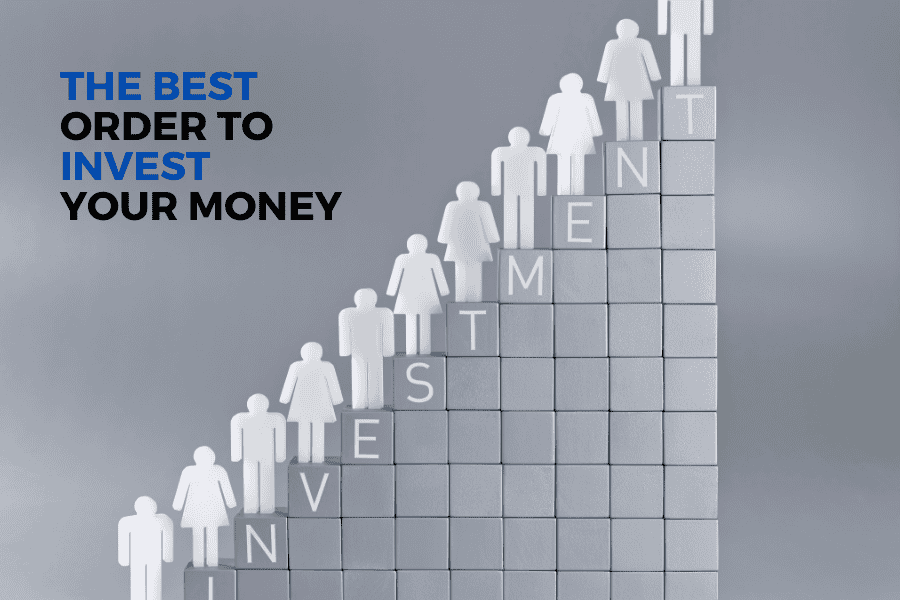Last Updated September 8, 2024 by Davina Kelly
Managing your money can be overwhelming, especially with so many different financial obligations. But if you break it down into simple manageable steps, you can create a roadmap to financial freedom that works for you.
In this post, I’ll guide you through the best order to invest your money. This is based on the order I personally followed when I was getting started.
For context, I used to be stuck in payday loan debt with no savings to fall back on. However, once I cleared my debt, I finally broke free from living paycheck to paycheck, improved my finances and began my journey to build wealth.
By following these steps you can build a solid financial foundation, eliminate debt and steadily grow your wealth.
This post may contain affiliate links, which means we will receive a commission if you purchase through our links, at no extra cost to you. Please read full disclosure for more information.
The Best Order To Invest Your Money:
1. Build an Emergency Fund
Before you start investing your money the first thing you want to do is build an emergency fund. This won’t generate any returns but it provides a safety net to protect you from financial setbacks.
For example, if you have any unexpected medical costs, car repairs or job loss you can use your fund to cover these costs.
Having an emergency fund frees you from the stress of financial uncertainty and ensures that you won’t need to rely on debt to handle small emergencies. It also gives you a sense of security and peace of mind.
Start by saving one month’s worth of living expenses. This will cover most small emergencies and you can look into adding to this once you’ve completed the next step.
This money isn’t to be used for everyday expenses. It really needs to be set aside strictly for emergencies and forgotten about.
Keep it in a high-interest savings account that you can easily access without paying any fees. The interest earned will help your savings grow and protect you from inflation.
2. Pay Off High-Interest Debt
Once your emergency fund is in place, your next priority should be paying off debt. High-interest debt, in particular, can drain your finances and limit your ability to save and invest.
When I say high-interest debt I’m referring to consumer debt such as credit cards, payday loans and overdrafts. This type of debt carries high interest rates and can really restrict your income.
Credit card debt is a common struggle for most people. It’s become the norm to pay for expensive items you can’t afford like designer bags or shoes using credit and dealing with the consequences later.
At the time of writing this, the average credit card interest rate is 24.9%. If you’re paying 24.9% on a credit card, any investment returns you make will be negated by those debt payments.
So, by paying off this debt you’ll give yourself a guaranteed return on investment equivalent to the interest rate you were paying.
For example, paying off a 24.9% interest rate is like earning a 24.9% return on investment, something that’s very hard to achieve in the stock market.
Aside from the numbers, paying off high-interest debt gives you a sense of accomplishment and control over your finances. It frees up cash flow, reduces stress and allows you to focus on bigger financial goals like building wealth.
3. Max Out Your Pension
After tackling debt, the next step is to take full advantage of your employer’s pension, especially if they offer a matching contribution.
Employer matching is essentially free money! It’s one of the best deals you’ll get with your finances so don’t miss out on this opportunity.
You might be thinking, why is this so important? Here’s why. When your employer offers to match your retirement contributions, it’s like getting an instant return on your investment.
For example, if your employer matches 100% of your contributions up to 5% of your salary, you’re effectively doubling your money right away.
Over time, this can significantly boost your retirement savings. So, I suggest you take full advantage of this benefit and maximise your retirement planning efforts.
Maxing out your employer contributions will also set you up for long-term financial security.
I understand that pensions are often something most people tend to overlook or put off until later. But the earlier you start contributing, the more time your investments have to grow, thanks to the magic of compound interest.
Don’t leave this money on the table, start contributing enough to get a full match! Your future self will thank you when you’re able to fully enjoy your golden years with financial security.
4. Invest In The Stock Market
With your emergency fund in place and high-interest debt eliminated, it’s finally time to invest in the stock market.
I suggest sticking with index funds, especially if you’re a beginner. These funds are diversified, low risk and have low fees which is exactly what you want when investing your money.
Investing in the stock market is one of the most effective ways to build wealth over the long term. It offers the potential for consistent returns and allows you to benefit from compound interest. This is where your investment earnings generate additional income.
One of the best ways to invest is through a tax-advantage account which offers significant tax savings. These accounts provide tax benefits and allow your money to grow more efficiently.
In the UK, this includes Individual Savings Accounts (ISAs), in the US it includes Roth IRAs.
Investing through tax-advantaged accounts means your profits are essentially shielded from taxes. This means you won’t have to pay capital gains tax on any returns you earn.
Related: How To Invest In Index Funds (A Complete Beginners Guide)
5. Build a Larger Savings Fund
Once you’ve started investing in the stock market, it’s a good idea to focus on building a larger savings fund.
While your emergency fund is designed to handle short-term crises, a larger savings fund can provide additional security and flexibility. This fund can help you achieve bigger financial goals like buying a home, starting a business or even taking some time off work.
Having a big savings fund gives you more financial security and peace of mind. It also allows you to take advantage of opportunities that may require upfront investment. For example, you might use this fund to purchase a rental property or fund a business venture.
Knowing that you have a financial cushion beyond your emergency fund can help you sleep better at night and make more confident financial decisions.
Aim to save three to six months of living expenses in addition to your emergency fund. If you’re self-employed I suggest saving nine to twelve months.
Once you’ve reached this goal you can continue contributing to the fund to take advantage of any future opportunities that come your way.
This may not seem like the best order to invest money for some people, but it has worked really well for me. I was able to consistently invest in the stock market while simultaneously growing a larger savings fund for other investments I wanted to pursue.

6. Invest In Yourself
Saving and investing are essential, but don’t forget to invest in your most valuable asset: Yourself! This is an often overlooked aspect of investing.
As Warren Buffet famously said, “The greatest investment you can make is in yourself.”
Your earning potential is one of your greatest assets and by enhancing your skills and knowledge you can significantly increase your income.
Remember, you can only save as much as you can earn, so by increasing your earning potential you can fast-track your financial goals.
Whether you’re aiming for a promotion, switching careers, or starting a side hustle investing in your personal development can yield high returns.
Not only does it allow you to save and invest more effectively, but it also boosts your confidence and job satisfaction.
When you continuously grow and challenge yourself, you’re less likely to feel bored and unmotivated. By equipping yourself with the right skills and knowledge, you’ll be more willing to take risks and pursue new opportunities.
You can invest in yourself by taking online courses or pursuing certifications that help you land higher-paying jobs or advance your career. Platforms like Skillshare offer thousands of classes that can help you develop the skills you need to succeed. They have classes on everything from entrepreneurship and copywriting to editing and time management.
You can try it out FREE for 30 days here and get access to unlimited classes. It’s like Netflix for learning.
7. Pay Off Low-Interest Debt
After you’ve started investing, you may still have low-interest debt such as student loans or car loans. While this debt doesn’t carry the same urgency as high-interest debt, it’s still important to consider paying it off.
Paying off low-interest debt will simplify your finances. The fewer payments you have to make each month, the easier it is to manage your budget and stay on track with your financial goals.
If you’re trying to decide whether to pay off this low-interest debt or invest, the decision depends on your financial situation and goals.
If paying off the debt will help you save money in the long run and provide peace of mind, it may be worth focusing on.
However, if the interest rate is low and you have the opportunity to invest that money at a higher return, investing may be the better option.
8. Pay Off Your Mortgage (Optional)
The final step on this list of the best order to invest money is paying off your mortgage. This step is highly optional and depends on your financial situation and goals.
Paying off your mortgage can provide psychological benefits such as peace of mind and the freedom of living debt-free. Making overpayments on your mortgage can also save you a lot of money on interest in the long run.
But on the other hand mortgage rates are typically low and are long-term commitments. So, if you choose to prioritise investing instead of paying off your mortgage you may benefit from compound interest and long-term growth in the stock market.
That being said, if you purchased your home during a period of low interest rates but have had to recently remortgage at a higher interest rate, paying your mortgage off might become a higher priority.
Carefully weigh your options to decide what’s best for your financial future.
Before making any overpayment on your mortgage, it’s essential to check the terms of your mortgage. Some mortgages may have limits on overpayments or early repayment charges.
If your mortgage doesn’t allow flexible overpayments, investing your money elsewhere may be a better option.
Final Thoughts about The Best Order To Invest Your Money
This list of the best order to invest your money is not set in stone, it all depends on your personal circumstances. For example, if you don’t have any low-interest debt or a mortgage you can simply skip these steps.
But if all the points in this list apply, this is the best order to invest your money and build wealth. It has worked well for me and I am the most financially stable I have ever been.
However, it didn’t happen overnight!
Financial success requires careful planning, discipline and patience. If you apply the right strategies and stay consistent you can achieve financial freedom.
Do you think this is the best order to invest your money? Let me know in the comments below.
This post was all about the best order to invest your money.
Other Posts You May Like:
The Ultimate Guide To Investing for Beginners
10 Smart Income Generating Assets You Should Acquire
10 Best Financial Goal Examples To Build Wealth

Davina Kelly
Hey! I'm Davina, the owner of Davinas Finance Corner. I'm passionate about finding ways to budget, save, earn more money and improve your life. After breaking free from payday loan debt and living paycheck to paycheck I want to share my experience to help other women improve their finances.

Really interesting and helpful, thanks for sharing!!!
You’re welcome. I’m glad you found it helpful 🙂